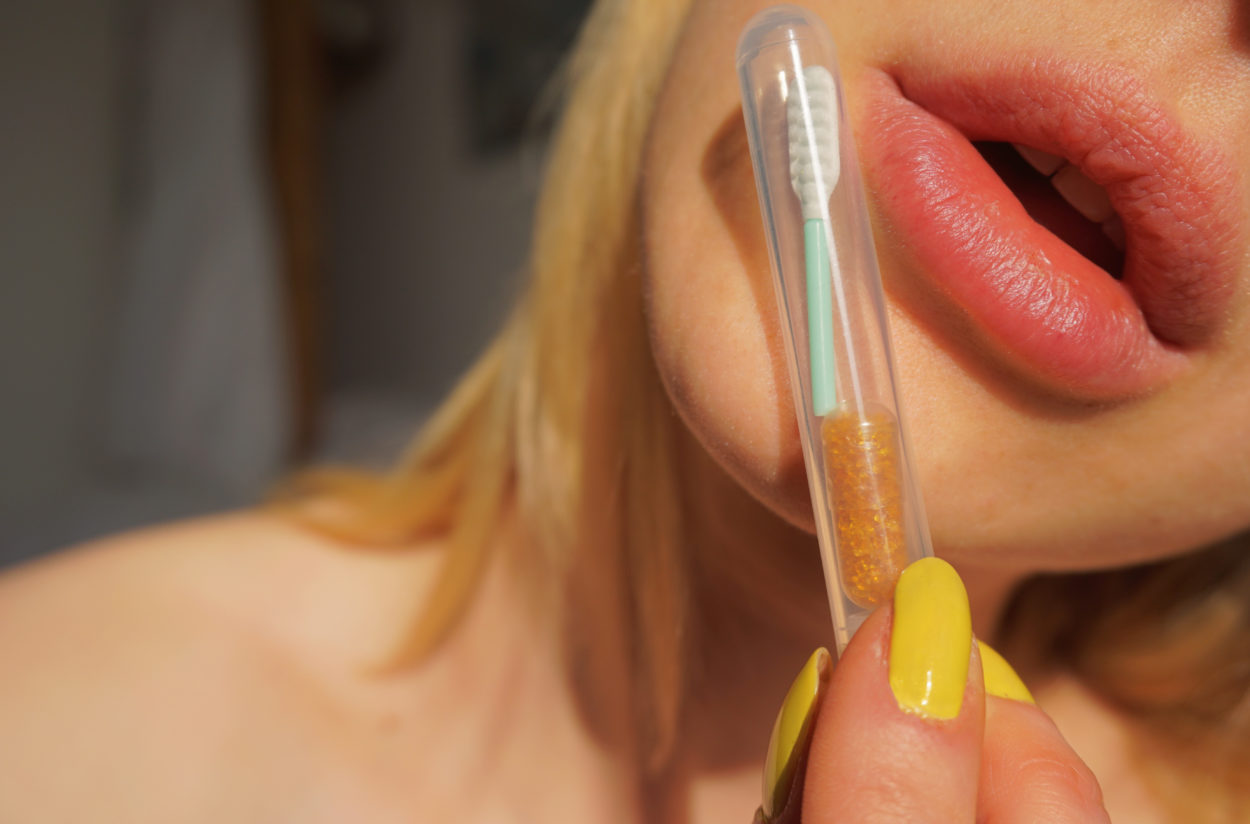In light of the COVID-19 pandemic, sex worker Lilia Lilith explores the history of how the public sphere has shaped attitudes towards the industry and touch…

Corona is Not a New World Order. We Have Been Here Before: How the Public Sphere Changed Conceptions of Touch, Contamination, and Sex Work.
I am a sex worker.
I work visually, theoretically, and politically on questions regarding sex, intimacy, and the body.

I live in Amsterdam and I see my clients in person. As such due to Covid-19, I am currently not allowed to work, and so spend my time in a small studio by myself. In this unprecedented withdrawal from intimacy and public spaces, I find myself reflecting upon my creative contribution to the New York exhibition ‘Art in Odd Places: Body’ (2018), a yearly festival taking place in the public spaces of the city. The work I submitted, ‘A Documentation of Intimacy’, partly consisted of a performance piece called ‘Contaminated’, in which I sat in Union Square and invited strangers to sit down and share a moment with me as they swabbed their mouths with a swab, after which I swabbed my mouth with the same one. The purpose of this exercise was to bring into focus to both the body’s vulnerability and the stigma related to sex work. The ongoing pandemic has forced us all to become acutely aware of our bodily vulnerability. Many ongoing conversations circulating from both independent commentators and news sources speculate about society after Corona, how it will differ; if at all.

If such a thing can be broadly summarised, the general consensus seems to be that future pandemics are likely – perhaps highly likely – and therefore predictions of increased Foucauldian ‘Biopower’, which is the concept of state control over bodily rights, as opposed to sovereign power, follow. The worldwide scale of the Covid-19 pandemic in our hyper-connected times has fuelled anxiety of such a future, but are these visions of the new world order quite so new after all?
Sex work has long laboured under the social stigma of being dirty and shameful, and by extension, those labels also apply to the people who perform it. Intimacy is closely tied to both sex and shame, and to become intimate is, in part, to be exposed and vulnerable. Thus with physical intimacy, it is the physical body that is put at risk – as Olive Cheung notes in her study of how Hong Kong sex workers manage bodily fluids: “Body emissions have long been identified as polluting” and “perceived as a potential health threat” (243). In both Cheung’s study and Deborah J Warr & Priscilla M Pyett’s study in Australia, the condom for sex workers does not only protect from the physical risk of infection, but also as a psychological barrier against the sense of disgust at exposure to the semen from a client and the intimate flesh to flesh contact (Cheung 242-243, Warr and Pyett 302). As discussed by Jake Bulmgart in his article “Why Don’t We Use Condoms for Oral Sex?”, it could be argued that, at least in the Western world, sex workers are much more informed about safe sex than the average person. For example, and from experience, we are among the minority who regularly use condoms for oral sex.
So with this in mind, why is the prostituted body considered dirty? No one raises an eyebrow when strangers are kissing in a bar – what is the difference? Arguably it is the number of people we are intimate with. Yet by that rationale, sex work would be acceptable every few days or weeks. However, many sex workers only see clients periodically and still have to endure stigmatization. Part of the ‘sex work = dirty’ equation, and what my performance tried to show by separating the intimate physiological experience of kissing from the intimate psychological one; is that sex work disregards the ‘true’ emotional involvement that makes physical intimacy worth the risk. ‘True’ here does not imply an absence of emotion, but rather that the emotional labour we do is performed through surface and deep acting. This ability to separate desire from love is historically considered a typical masculine trait, and when exhibited in women, it is considered a fault (Bernstein 116). Female sex work challenges these historically gendered assumptions about sexuality which explains why female sex work is specifically targeted in debates.

Society has not always considered prostitution dirty and wrong; this shift in opinion occurred fairly recently. As Elisabeth Bernstein explains, this female-oriented dirtiness took hold with the rise of modern prostitution, since it contradicted “the assumption that the proper domain of women’s sexual expression was the intimate, romantic relationship in the private sphere” (8). Sex work, as we think of it today, took shape with industrial capitalism. It is a result of the changes brought to the private and public spheres , urbanisation and the increase of waged labour (Bernstein 23). As Ruth Rosen puts it, “the Victorian policy of ‘quiet toleration’ and the view of prostitution as a ‘necessary evil’ were ultimately replaced during this period by a new focus on prostitution as social evil” (Bernstein 8). As such, it is worth considering how these changes contributed to the erasure of sex work tolerance.

© Walter Wlodarczyk
Bernstein notes that sex work is not often considered in relation to urbanization, but it is important to note that alongside industrialisation came the public sphere. It is during the late 18th century that “a vibrant public life developed, as well as public geography with parks, promenades, theatres. . . In the structure provided by this public geography, diverse and complex social groups (of strangers) were brought into contact and struggled to define social order” (Linke 12). Early prostitution was generally an exchange of goods and services, often taking place within the immediate sphere and community of these women (Bernstein 24). Not until the “onset of modern industrial capitalism and an increasingly gendered social divide between public and private spheres did a new class of specially demarcated ‘public women’ come under increasing scrutiny and control” (24). For example, in California, by 1890 a general order was issued that prohibited people from visiting houses ‘of ill fame’, and by 1909 workers were prohibited from soliciting in the streets. By 1913 83 brothels were closed, leaving 1,073 women on the streets (Bernstein 27). However, depending on the country and its regulations, formal or informal sex districts in the urban space developed (Bernstein 28-29). In 2001 street prostitution was estimated to have gone down to 2% of the total industry figure (Bernstein 10), and yet the ‘ill-famed’ streetwalker and the crime, violence, and dirtiness associated with her remains the normative perception sex work.

© Walter Wlodarczyk
Notably, also a heightened fear of contamination followed these changes during the Victorian era. The conceptualisation of the public and the subsequent threat of typhus and tuberculosis (Gansky 136) , resulted in an increased preoccupation with privacy that spurred an intense fear for bad and polluted air:
“Bodies were divided from one another for privacy and propriety as well as for health. Such hygienic design particularly programmed households. By 1880, furniture such as twin beds prevented the sharing of fluids or air between couples.” (Gansky 134)
Many of these trends and changes revealed the privilege of the upper classes, but an unusual anomaly persisted in the form of the humble telephone booth. Before mobile communications were invented several decades later, the telephone booth was affordable and democratically shared, consequently becoming a cause for great concern. In his essay Privacy’s Waste Products: Touch, Contagion and Public Telephone Design, Paul Gansky states that much “more than a historic footnote, the design of the telephone booth is a distinctive aperture onto the juncture between health and media” (144). The telephone booth, as a closed, non-ventilated space used by rich and poor, quickly became “a fresh zone requiring crowd control, as class anxiety couched by the League in a rhetoric of protecting individual health and privacy” (137). Rather than urging improved health of the entire population, the booth generated the fear of societal interconnections and “baldly revealed that health was and is a cultural construct” (Gansky 144). Similarly, a member of ‘Save Our Streets’, a modern group created against street prostitution by residents and local business owners in San Francisco, says: “We’re not upset because its illegal or immoral, but because it disturbs our lives” (Berstein 37). Thus, the anxiety about dirty bodies in democratic spaces extends beyond the potential health threat to the very reminder that these bodies exist.
With this in mind, it is perhaps not too surprising that social workers and nurses reacted particularly positively to my performance in Union Square. Just like sex workers, through the social and body labour required of their work, they too come into contact with the most intimate aspects of bodies and lives on a regular basis. Dr Ian Hyslop, based in the Faculty of Education and Social Work at University of Auckland, states that: “I am happy for science and technology to manage Covid-19 but I am less happy for science to manage the problems of class conflict in liberal society – too often this translates into a focus on rooting out the underclass threat.” (Hysland). In New York, the poorer postcodes have been hit almost twice as hard as wealthier ones (Nychealth). After shelters closed in Nevada, homeless people have been approved to sleep at safe distances in parking lots, although the state is wealthy and currently has an abundance of empty hotels (Levin). In Singapore, who was initially heralded as a shining example of how to reduce the spread of the virus quickly, there has been a spike of cases and deaths in crowded migrant dormitories. These dormitories have been closed off, leaving up to 20 000 residents sealed in their “cramped and squalid quarters [that] are fast becoming a hotbed for infection” (Reuters). These are a few examples pointing to a global increase of unemployment, domestic violence, and evictions during the pandemic.
There are also, of course, many positive actions taking place in the world as a response to the pandemic. Also the notion of individual responsibility to support the collective seems to have taken hold fairly effectively. The individual capability to take measures has been varied, broadly along class lines, thus reflecting the spectrum of postmodern class division. Unlike Victorian times, classes are not so easily distinguished anymore. Since then, a fragmented New Middle Class has taken shape, marked by service, self-employment, credentialism, and social mobility. As street prostitution has decreased, self-employment, freelancing, and opt-in arrangements make up the majority of the market. Yet we struggle to get our labour and income recognised for compensation in these times. The lucky ones are eligible for general emergency funds, but many find that they have no choice but to collect food stamps at Christian organisations, who work actively to ‘help’ and ‘save us’ from our profession. Not only is this humiliating, but we worry what future strings are attached to these food stamps, since in order to receive them, we need to register with the organisations. This is merely one result of the increasingly hollowed out well-fare system. Neoliberalism encourages us to focus on our own climb with the promise of success as reward for hard work, but there are many now experiencing just how precarious that promise is. If society does not take responsibility for all fragments and divisions of class, then the future of good health, safe spaces, and the luxury of physical closeness may become restricted to those who are lucky enough to afford it.
Although Corona is presenting many new challenges, the subsequent changes to the private and public spheres induced by an invisible airborne threat echo a Victorian past. The sex industry is currently trying to find solutions for what seems to be a long term change, one of the suggestions being a paradoxically non-anonymous glory hole in plexiglass managed with condoms, gloves, masks, and sanitation. Will Covid-19 be the return to touch as “patently low class; an abject, sexualised disease-spreading channel” (Gansky 136)? Or instead will touch become an exclusive privilege only for some? Will our class fragmentation lead to a health-individualism, where the majority is not distinctly cut off from, and can enjoy a varying degree of, privilege? Will this health-spectrum obscure the increased disciplining of the classed body? We can indeed only speculate at this point. I wonder if perhaps, in such a future, starved of physical interaction and touch, we might come to appreciate the intimacy sex work provides and our labour might be acknowledged. Perhaps we might, at the very least, return to the social tolerance of sex work found in our past.

You can find more information and sex work related initiatives at the redumbrellafund and an extensive list of local fundraisings for sex workers in these times at Janeraider.
Work Cited
Bernstein, Elizabeth. Temporarily Yours: Intimacy, Authenticity, And The Commerce Of Sex.
1st ed., The University Chicago Press, 2007.
Blumgart, Jake. “Why Don’t We Use Condoms For Oral Sex?”. Pacific Standard, 2020,
https://psmag.com/social-justice/why-dont-we-wear-condoms-for-oral-sex-60632
Cheung, Olive, and Rachel Lara Cohen. “Chapter 15: Saliva, Semen and Sanity.”
Body/Sex/Work: Intimate, Embodied and Sexualized Labour, edited by Carol Wolkowitz et al., Palgrave Macmillan, 2013, pp. 239–253.
Gansky, Paul. “Privacy’s Waste Products: Touch, Contagion and Public Telephone Design”.
Journal of History, vol 27, no 2, 2013, pp. 132-147. https://doi.org/10.1093/jdh/ept042
Hyslop, Ian. “Lockdown Reality For ‘Other’ NZ”. Newsroom, 2020,
https://www.newsroom.co.nz/ideasroom/2020/04/16/1129771/lockdown-reality-for-other-nz.
Levin, Dan. “Las Vegas Places Homeless People In A Parking Lot, 6 Feet Apart”.
Nytimes.Com,2020,https://www.nytimes.com/2020/03/31/us/las-vegas-coronavirus-homeless-parking-lot.html.
LINKE, GABRIELE. “THE PUBLIC, THE PRIVATE, AND THE INTIMATE: RICHARD
SENNETT’S AND LAUREN BERLANT’S CULTURAL CRITICISM IN DIALOGUE.” Biography, vol. 34, no. 1, 2011, pp. 11–24. JSTOR, www.jstor.org/stable/23541175.
“Nychealth/Coronavirus-Data”. Github, 2020, https://github.com/nychealth/coronavirus-data.
Accessed 17 Apr 2020.
Reuters. “Asia Pacific: Migrant Workers Fear Massive Singapore Dormitory Lockdown Is
Coronavirus Time Bomb”. The New York Times, 2020, https://www.nytimes.com/reuters/2020/04/06/world/asia/06reuters-health-coronavirus-singapore-migrants.html.
Warr, Deborah J., and Priscilla M. Pyett. “Difficult Relations: Sex Work, Love and Intimacy.”
Sociology of Health and Illness, vol. 21, no. 3, 1999, pp. 290–309., doi:https://doi.org/10.1111/1467-9566.00157 .
Links:
By Lilla Lilith
Instagram: @lilla.lilith
As some of you already know, I am a sex worker. I have made the decision to make this (semi)official since I am increasingly working with themes on this topic also outside this role, and its is becoming a hassle keeping it apart. And I also, I can’t even be bothered to lie properly about this anymore and it is exhausting and disheartening having to keep a part of your life secret because of societal stigma.
I’ve decided to change my instaname moving forward. Lilith is a common alias for all of us lovely degenerates and thus provides a bit of anonymity while affiliating me with the larger movement working towards destigmatising us.
I know for certainty some people that will not want to be associated with me after hearing these news. That truly fucking sucks. But I wholeheartedly support the queering of norms, sexuality, and gender that sex work is. Take it or leave it. For those who leave: Cry me a river. For the rest: Love ya <3
Bibliography:
Reuters, 2020. Asia Pacific: Migrant Workers Fear Massive Singapore Dormitory Lockdown Is Coronavirus Time Bomb. [online] The New York Times. Available at: <https://www.nytimes.com/reuters/2020/04/06/world/asia/06reuters-health-coronavirus-singapore-migrants.html> [Accessed 21 April 2020].
Elisabeth Bernstein explains that we haven’t always considered prostitution as dirty and wrong. This female-oriented dirtiness took hold with the rise of modern prostitution, since it contradicted “the assumption that the proper domain of women’s sexual expression was the intimate, romantic relationship in the private sphere” (8). Sex work, as we think of it today, is modern and took shape with industrial capitalism.






Leave a Comment